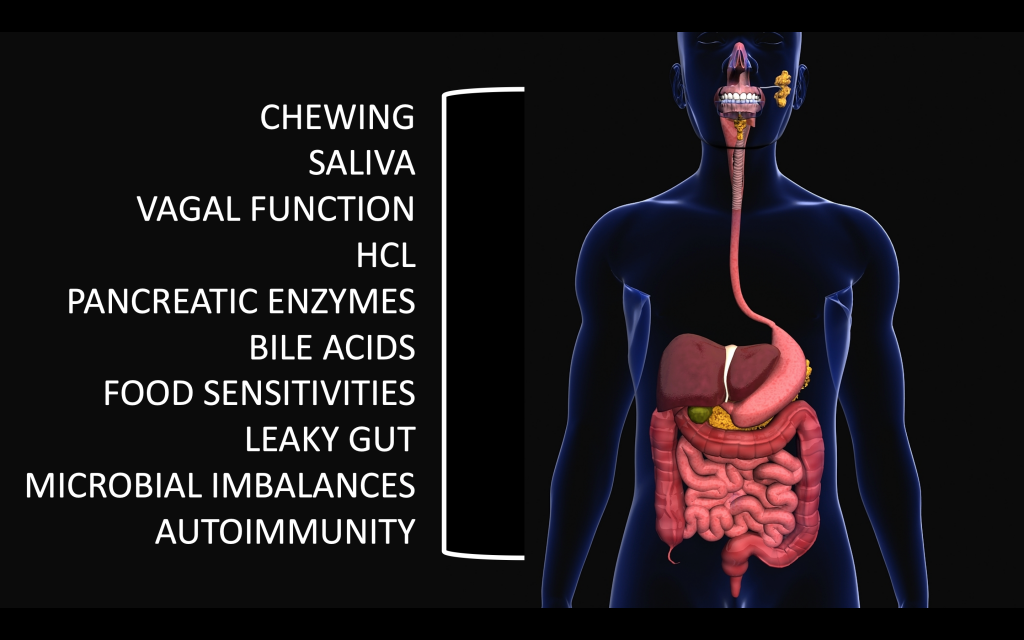Your digestive system is the foundation for so much of your health. It’s where you absorb the nutrients that energize your body, fuel your mind, and power vital aspects of your health like immune, thyroid, and hormone function.
When it isn’t working properly, it can trigger a whole cascade of symptoms and even increase your risk for chronic illness.
These aren’t signs that you want to ignore or just brush off as part of getting older!
And despite what you might read online, they aren’t all explained by leaky gut or cured by a daily probiotic or other trendy buzzwords.
Here are the warning signs to look out for, the top causes to investigate, and a 3-step approach to restoring optimal digestion.
Signs You’re Not Properly Digesting & Absorbing Your Food
Here are 9 red flags your GI system may be struggling to properly break down and absorb the nutrients from your food:
- Bloating, gas, diarrhea
- Fatigue and weakness
- Nutrient deficiencies, especially in fat-soluble vitamins and iron
- Pale, bulky, and foul-smelling stools
- Thyroid dysfunction
- Brain fog
- Hair loss and dry skin
- Unexplained weight loss
- Anxiety or depression
What Causes Digestion & Absorption Issues?
As you can see in this image, there are a LOT of stops along the digestive tract, and there many imbalances and types of dysfunction that can disrupt the process. Some are even outside of the gut, such as stress and environmental toxins!

Most people, and honestly a lot of practitioners, get hung up on the trendy areas that get the most buzz – leaky gut, microbiome imbalances, and food sensitivities.
Everyone is quick to jump on drinking bone broth, taking probiotics, and getting food sensitivity testing, and those strategies can certainly help. But they don’t cover all of the bases and they’re often just a shot in the dark.
This leads to a common scenario where patients find some relief from their symptoms, but their progress plateaus or they’re left with lingering issues that never fully clear.
It can also lead down a rabbit hole where you’re cutting out more and more foods to avoid symptoms and flare-ups. That may work for a little while, but it’s ultimately not sustainable.
It’s essential to take a top-down approach that looks at all of the factors that go into digestion and absorption!
A 3-Step Approach to Beating Digestive Issues
Here’s the process we use in my clinic to help patients pinpoint and overcome digestive issues.
1. Start with Your History
You have a unique story with specific genetic predispositions, stressors, triggers, and environmental factors that need to be taken into consideration.
I cannot emphasize this enough, there are no cookie-cutter solutions!
That’s why in our Adaptation Program I spend nearly 2 hours in the first appointment reviewing the details of each patient’s story so we can identify where things went wrong and what we need to investigate and address.
When it comes to digestive issues, I’m on the lookout for:
- How you were born
- Your history with antibiotics and other gut-disrupting medications
- What your diet looks like
- Your day-to-day stress levels
2. Get the Right Testing
From there, you can use a combination of conventional and functional lab testing to pinpoint specific imbalances. Your functional medicine provider can determine which tests are needed based on your symptoms and in-depth history.
Here are the tests I use most often in my clinic to help uncover the causes of digestive issues:
- Comprehensive bloodwork panel – provides a snapshot of your overall health, including vitamins, minerals, fatty acids, inflammatory markers, cholesterol levels, autoimmune markers, hormones, and so much more.
- Organic acid urine test – tells us what is happening in your small intestine and looks for signs of SIBO, fungal overgrowth, mold exposure, nutrient deficiencies, neurotransmitter imbalances, mitochondrial dysfunction, and detoxification issues
- Comprehensive stool test – identifies and evaluates bacterial, fungal, and viral pathogens, parasitic protozoa and worms, digestive function, immune response, and inflammation
- SIBO breath test – the lactulose breath test is the gold standard for identifying if you have SIBO and if it is methane or hydrogen-dominant
- Leaky gut test – using antibody testing, you can determine if your gut is leaky and narrow down the likely causes (this is preferred over zonulin-only testing)
- Food sensitivity testing – can be very helpful if patients are struggling with a lot of food intolerances and in children who have a harder time with elimination diets
3. Treat Your Root Causes Systematically
Now that you know exactly what factors are causing your symptoms, you can tackle them systematically. That means no more relying on guesswork, following cookie-cutter online programs, or wasting hundreds of dollars on supplements that might help.
Instead, you and your practitioner can develop a treatment plan based on your exact needs!
In my clinic, this typically involves:
- An anti-inflammatory diet tailored to your nutritional deficiencies
- Herbal treatments for pathogens such as SIBO, Candida, or parasites
- Neutraceutical support for factors like stomach acid and digestive enzymes
- Lifestyle strategies such as vagal nerve exercises, stress relief practices, and detoxification therapies
If you’re ready for a comprehensive, top-down approach to your digestion, check out our Adaptation Program and book your free discovery call to get started!
About the Author: Dr. Seth Osgood is a Doctor of Nursing Practice, Board Certified Family Nurse Practitioner and Institute of Functional Medicine (IFM) Certified Practitioner. Dr. Osgood received his post-graduate training in Functional Medicine through the IFM and from working with Dr. Amy Myers. He has helped people from around the world improve their health utilizing a Functional Medicine approach.
Want to work with Dr. Osgood and the GrassRoots team? Become a patient in our West Lebanon, New Hampshire Functional Medicine clinic, our Burlington, Vermont Functional Medicine clinic, or our Austin, Texas Functional Medicine clinic!






0 Comments